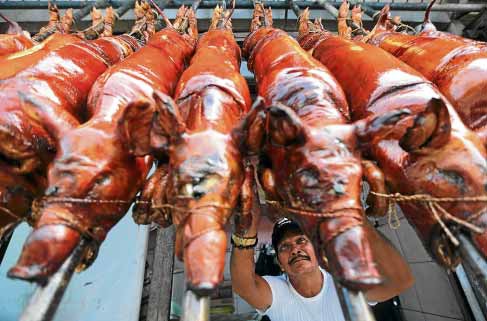SANTA MARIA, Bulacan, Philippines — Rising prices of pork skin have aggravated the impact of the African swine fever (ASF) scare on “chicharon” makers in Bulacan province.
The government has tightened controls over the importation of most pork commodities that may result in supply shortages for processed hog skin used in making the popular cracklings in the province, said Lailanie Aguilar of the municipal tourism office.
There is no African swine fever in Bulacan, according to Voltaire Basinang, Bulacan provincial veterinarian.
“[But] while our chicharon makers rely on the domestic pork skin supply, they require imported skin too to augment their needs, and many fear the import restrictions have started to affect prices,” Aguilar said.
Prices of Bulacan chicharon, however, remain stable, she added.
About 40 chicharon manufacturers operate in this town, half of them small-scale producers.
A local chicharon maker said the scare may worsen world market prices for imported pig skin, which have been rising since 2018.
The manufacturer, who asked not to be named to protect his business, said he imported his pork skin from Spain, where hogs are unaffected by the African swine fever virus.
Not concerned, but…
“We are not concerned about shortage at the moment, but prices of imported hog skin has spiked. In November last year, pork skin cost P56 a kilo, which rose to P62 and P68 in December. From January to March, prices rose to P78,” he said.
He said prices rose to P80 a kilo from April to July, then to P99 in August.
“Imported pork meat from ASF-cleared countries ensures that the Bulacan chicharon trade will be spared from the scare, although the pig disease does not affect humans at all,” he said.
Belgium and Germany are also known suppliers of pork skin, but manufacturers here said these countries have banned their products because African swine fever has been detected there.
“Our government has become very strict, but Spain alone cannot supply the requirements of all Bulacan manufacturers,” a maker said. —Carmela Reyes-Estrope
